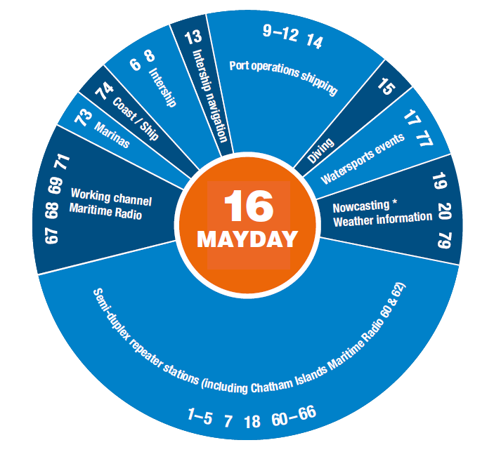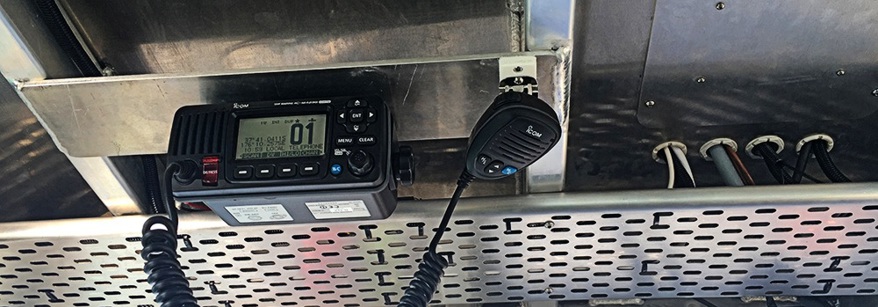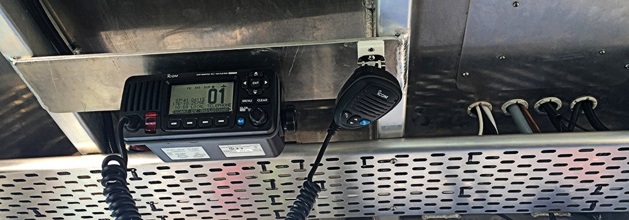Tips on how to make distress calls on the VHF radio and TRs, also known as trip reports. See a list of marine channels for key Bay of Plenty centres.

Newer VHF Radios may have four digits.
For weather information via Nowcasting, please add 20 before the channel e.g. 2019, 2020 or 2079.
Tauranga marine radio frequencies
| Boat to boat | Ch. 06 and Ch. 08 |
| International distress and calling frequency | Ch. 16 |
| Maketū Coastguard | Ch. 01 (24 hours) |
| Port of Tauranga Radio | Ch. 12 |
| Tauranga Bridge Marina | Ch. 73 |
| Tauranga Coastguard | Ch. 01 (24 hours) Ch. 19 and Ch. 79 (24 hour weather channel) |
| Waihī Beach | Ch. 07 (24 hours) |
Rotorua marine radio frequencies
| Rotorua Lakes | Ch. 02 (24 hours) |
Working frequencies are 06, 08 and 64. Please use these vessel to vessel. Visitors to the area are welcome to use these services.
Whakatāne marine radio frequencies
| Whakatāne | Ch. 18 (24 hours) |
| Ōpōtiki | Ch. 18 (24 hours) |
| Waihau Bay | Ch. 65 (24 hours) |
How to make a voyage or trip report
Often called a TR, here is how to log a Trip Report with your local coastguard using VHF radio.
Listen to the station for approx. 10 seconds, check there is no-one else using the frequency.
- Make a call using the VHF Channel of your local Coastguard station.
- “Tauranga Coastguard, Tauranga Coastguard, Tauranga Coastguard, this is YOUR VESSEL NAME AND CALL SIGN for a Trip Report. Over.”
- Wait for Coastguard station to acknowledge you.
- “We are departing YOUR CURRENT LOCATION.”
- “We are heading to YOUR DESTINATION and our ETA is TIME YOU EXPECT TO ARRIVE.”
- “We have NUMBER OF PEOPLE ONBOARD (i.e. 2 adults and 2 children). Over.”
- Wait for confirmation from Coastguard station that they have received your detail.
- “Thank you Coastguard Radio, this is YOUR VESSEL NAME. Out/Clear.”
Remember to cancel your TR when you have arrived safely.
Note: Failing to close a TR will NOT initiate a search. If you need assistance you must call for help.
How to make a radio distress call
Use only if you are in imminent danger and need immediate help!
Activate distress beacon if carried. Make sure everyone is wearing lifejackets. Switch radio to full power.
- VHF Ch 16 (or SSB 2182, 4125, 6215, 8291).
- MAYDAY MAYDAY MAYDAY.
- This is YOUR VESSEL NAME (THREE TIMES).
- Call sign of OF THE VESSEL (ONCE).
- MAYDAY VESSEL NAME AND CALL SIGN.
- Vessel’s latitude and longitude, or bearing and distance from known landmark.
- Nature of distress and assistance required.
- Any other information e.g. number of persons on board, description of vessel, life raft or dinghy carried.
- OVER.
- Allow a short time for a reply. If no reply, repeat the distress call, working through all the distress frequencies on the radio. If contact is made with a shore station, tell them if you have activated your distress beacon and follow their instructions.
Weather
Knowing the weather and tide conditions can make all the difference to your day out on our harbours and lakes.
It is important to respect the weather. No matter what craft you are on, you should always check the marine weather forecast and know the tide times before you head out. Here are some helpful sources for marine weather forecasts in the Bay of Plenty.
- 24/7 marine wind and weather conditions via VHF Radio - Bay of Plenty Ch. 79.
- Newer VHF Radios may have four digits. If so please add 20 before new channels e.g. – 79 becomes 2079.
Tides
Tide tables can be found in many places; your local fishing shop, your local paper, Coastguard handbooks and, of course, online.
LINZ are responsible for New Zealand’s hydrographic information and produce our tide charts. You can download tide charts from the LINZ website (below) for all areas and for the whole year ahead.
Apps for your phone
There are a number of smartphone apps that allow you to check information while you're out and about.
Some of these include:
- MetService Marine
- MarineMate
- Swell-map
- Coastguard - Boaties Best Mate
- MarineTraffic
- PredictWind
- Windguru
- MarineForecaster
Useful weather websites


